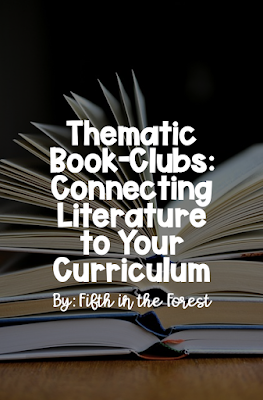Few occupations have mastered the art of multi-tasking like teachers. By now I’m sure you know just how useful it is to make connections in the classroom. Any time you can cover multiple standards at once is a win!
One of my favorite ways to connect literature and other standards is through book clubs! Thematic book clubs can be a powerful way to enhance your students' learning experiences.
In this blog post, I'll give you practical reasons to align your book clubs with subjects like history, science, or geography. Whether you're just starting with book clubs or have plenty of experience, my goal is to show you the tangible benefits of integrating thematic book clubs into your teaching approach.
As an extra resource, I've also assembled a list of recommended books, available for FREE download, to connect literature and social studies. Download my favorite historical novels to use in thematic book clubs here!
Thematic Book-Clubs: Connecting Literature to Your Curriculum
1. Fostering Deeper Engagement and Application:
Thematic book clubs provide students with a context that makes learning more relatable and engaging. When books align with other subject areas, students are more likely to become involved in both reading and subject matter. This encourages participation in discussions, debates, and activities related to both the book and the curriculum.
2. Strengthening Cross-Disciplinary Connections:
Integrating literature into social studies, science, geography, etc. breaks down the walls between subject areas. Students can see how different subjects are interconnected, promoting holistic learning and a broader understanding of real-world applications.
3. Encouraging Critical Thinking:
Thematic book clubs require students to analyze, evaluate, and make connections between the text and curriculum concepts. This encourages critical thinking and higher-order cognitive skills development.
4. Fostering a Love for Reading:
When students see the relevance of literature to their studies, they are more likely to develop a genuine love for reading. This love for reading extends beyond the classroom, nurturing lifelong learners.
5. Enhancing Comprehension and Retention:
Students tend to remember and understand subject matter more effectively when they encounter it in a narrative context. Literature offers a compelling narrative that aids in comprehension and long-term retention.
Regardless of whether you're a newcomer to book clubs or a seasoned educator, I hope you see the advantages of integrating these clubs into your teaching approach. The ability to foster deeper engagement, strengthen cross-disciplinary connections, and encourage critical thinking are just a few of the benefits you can reap. This will elevate your students' learning experiences and bridge the gap between literature and education.




No comments
Post a Comment